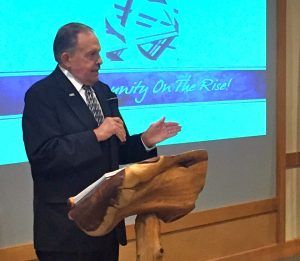Owen out as FCRA director due to health issues
by February 26, 2019 4:49 pm 1,541 views

Ivy Owen, the face and often evangelical voice of the Fort Chaffee Redevelopment Authority (FCRA) for more than 11 years, is no longer the authority’s executive director. The FRCA Board of Trustees announced Tuesday (Feb. 26) Owen’s health prevented him from remaining employed.
The board voted in an executive session Thursday (Feb. 21) that Owen was no longer able to fulfill his responsibilities due to health issues and because of that he would no longer be employed by FCRA.
“This decision was not made lightly. The trustees took all factors into account before voting. We all wish him the best and hope he will enjoy a full recovery in the future,” said Dean Gibson, board chairman. “The trust believed Ivy’s health had become an issue that kept him from doing the job we needed him to do.”
Having been in the economic and community development industry for more than 50 years, Owen has served in multiple prominent positions. He was hired by the FCRA board in December 2007. Under his leadership, the Fort Chaffee Redevelopment Authority 1995 Base Realignment and Closure (BRAC) economic development project has received multiple national, state, and regional awards, and reached more than $1.651 Billion in projected capital investments (based on property sold through the end of 2018), a media release stated.
“We have a lot of respect for and owe a debt of gratitude to Ivy for all that he has done,” Gibson said.
Owen’s contract was extended in February 2017 through the end of 2018. In December 2017, he told Talk Business & Politics he had no plans to retire, stating he was ready to extend his contract through the end of 2019. Owen, responding to a question from Talk Business & Politics about his future with the FCRA, said he had “no plans to retire yet” though he understood “how you could get that idea.”
In June, Gibson told the board Owen was “well on his way to recovery” after an extended illness and would be back in the office by mid-July. He had been out of the office since April at that time. Owen missed the January and February board meetings.
Gibson said they do not know who will take over as executive director.
“We have two options. We can have an interim director, but that would mean we would need to find someone who could start immediately. Or we can just go find a permanent replacement, which we will need to do anyway,” Gibson said.

The board does not have a time frame on finding a replacement for the position, Gibson said, noting, they would be open to all options and “find the best possible candidate.”
Owen officially took the reins of FCRA in 2008, taking the role once held by former Fort Smith Mayor Sandy Sanders. He oversaw the majority of Chaffee Crossing’s development. Under Owen’s tenure, Chaffee Crossing welcomed the Arkansas Colleges of Health Education (ACHE), which opened its inaugural college, the Arkansas College of Osteopathic Medicine (ARCOM), to a class of 150 students in July 2017. It began construction of a second college, the Arkansas College of Health Sciences (ARCHS), in 2018.
Land values have increased rapidly since the BRAC process deeded the land to the area in 1995. An appraisal shortly after Owen arrived on the property that is now Umarex classified the land as “farm land” and valued it at $2,500 per acre. Using that number, the entire development would have been worth around $17.5 million prior to developments. It has since won major developments like the ArcBest headquarters, residential and commercial developments from ERC Holdings, and ACHE. With the investments, values have increased significantly to the point that, according to Sebastian County Assessor Zach Johnson, assessed lands in the Chaffee Crossing boundaries from 2011-2017 had a tax value of $6.916 million. That figure is 20% of the land value, which would estimate growth from the aforementioned $17.5 million (for everything) to around $34.5 million just for the land FCRA placed back on tax rolls.
In the annual report, presented to the board Feb. 21, Lorrie Robertson, FCRA director of marketing, said $11.2 million had been generated in real estate taxes from 2011-2018. Of the original 7,000 acres, there were 1,575 developable acres of land and 860 acres of greenspace for sale as of the end of 2018.
There are more than 2,600 jobs in 164 businesses in Chaffee Crossing, with a projected 3,250 jobs and 1,050 students working and learning in the area by 2024.
